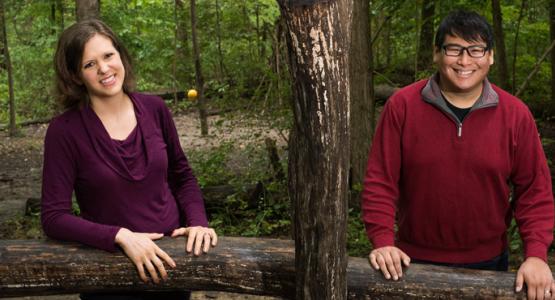
November 2018 Feature: Balancing Act
Story by Michele Joseph / Photos of the Wongs by Ty Wright,
To have and to hold, from this day forward, for better, for worse, for richer, for poorer, in sickness and in health, through board meetings and visitations, home and school fundraisers, packing and moving, till death do us part. For pastoral couples, wedding vows take on a whole new meaning. How do they navigate life in the ministry spotlight?
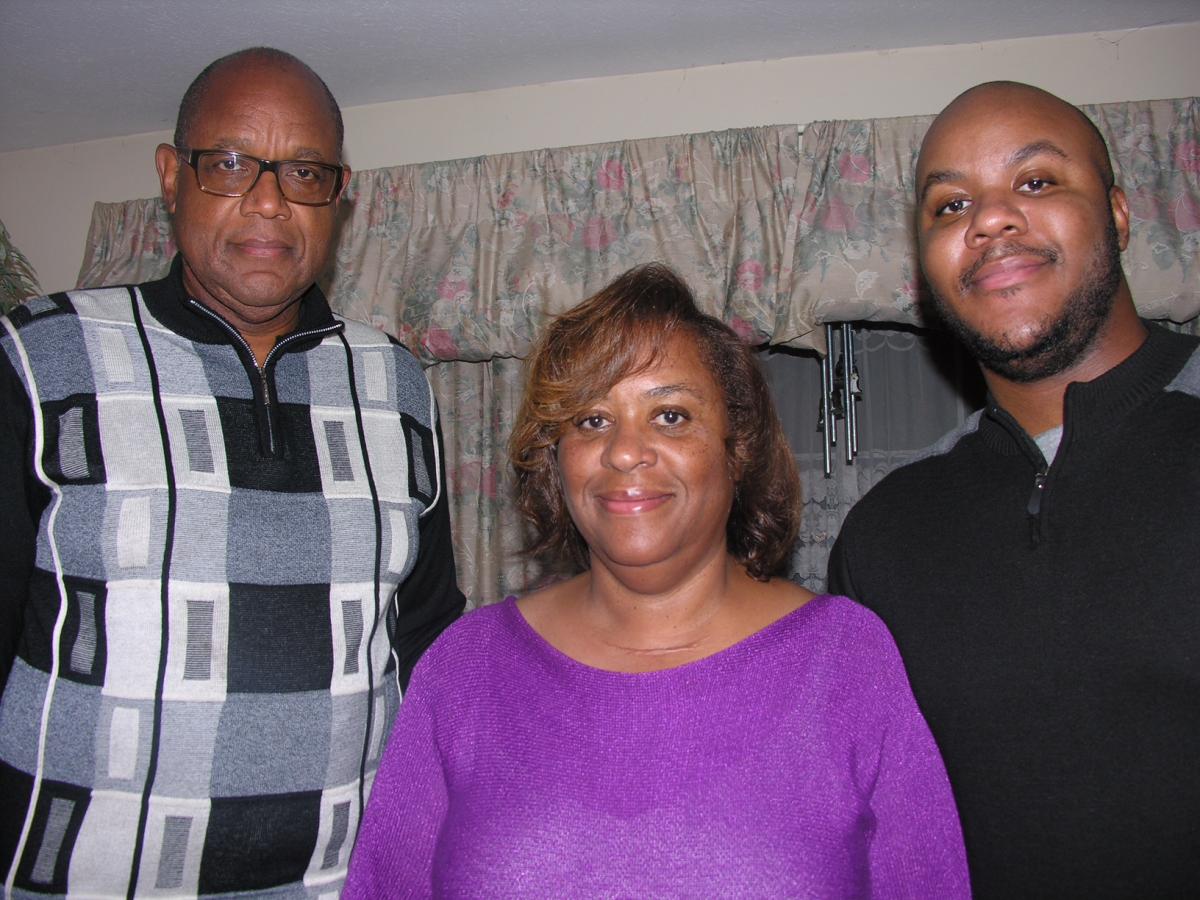 Understanding the Call
Understanding the Call
Cindy Washington (pictured with her husband, Kenneth, and their son, Kendrick) compares the calling of a pastoral couple to a joint checking account, where all the nances are mingled together and cannot be separated.
“It is a ministry that God has ordained and put us together to work together,” she says.
Understanding how that worked took some time. When she married Kenneth Washington 35 years ago, some seasoned pastors’ wives told her to make sure she had her own life and didn’t depend on her husband. She thought that meant “he does his thing, and I do my thing,” even as she was deeply involved in church. While she did support her husband, pastor of Allegheny West Conference’s Bethel church in Cleveland, her mindset kept his ministry separate from her purpose.
“Later God revealed that’s not how it is,” Cindy says.
Now as an experienced pastor’s wife, she views her role as a team member on a mission alongside her husband to win souls for Christ.
While a noble idea, the role is not always a welcomed one.
Cindy’s husband was already a pastor when they married. Conversely, Kathy Pepper’s husband, Stewart, worked as a literature evangelist, and then, for 17 years, in the book bindery at the Review and Herald Publishing Association, then head-quartered in Hagerstown, Md.
Stewart’s revelation to become a pastor took the family by surprise.
“I threw an absolute fit, and that’s the nice way of saying it,” Kathy recalls. “... I went kicking and screaming into the ministry because I saw ministry as a fishbowl. Everyone was going to be watching what you did and criticizing.”
She worried her children, then 13, 8 and 3, would be on display. Priska Volpe—whose children were 19, 18, 10 and 6 when their father became a pastor—had similar concerns. She worried she’d be trapped by expectations and never see her husband who was meeting the 24/7 demands of ministry.
“They don’t have their weekends off,” she says. “They don’t have their evenings.”
Volpe’s husband, James, served in the Coast Guard for 10 years, and then worked as a house painter.
She knew she didn’t want to be a pastor’s wife based on her dating history. In fact, at 18, she turned down a marriage proposal from a seminarian because she felt the role of a pastor’s wife was “too much responsibility” and felt sorry for pastors’ wives, she recalls. “It was dealing with people and their drama and being in the spotlight and having to maybe portray a certain cliché.”
With time and experience in the ministry, both Kathy and Priska have changed their views.
A year after becoming a pastor, Kathy’s husband, Stewart, was ready to quit.
“I said, ‘That’s fine, I’m staying,’” she says. “In a year’s time, my attitude totally switched. I love ministry.”
That doesn’t mean it has been easy. During their first evangelistic series, “war” broke out in the Pepper home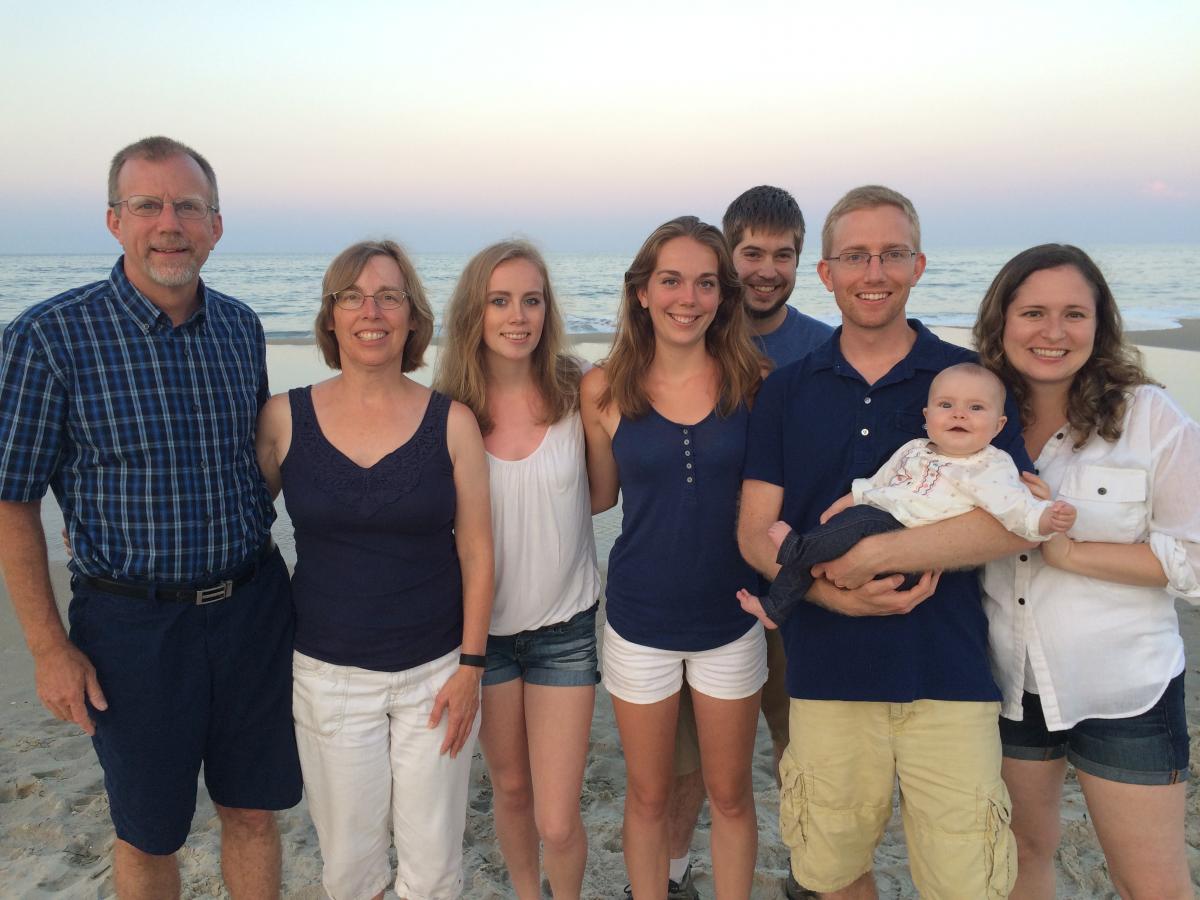 .
.
Stewart and Kathy Pepper, with Jessica Pepper; Katrina and Graydon Jedamski; and Jeremy (holding Makayla) and Rebecca Pepper gather during a family vacation.
“Both of us, especially he, was under so much pressure to get it right, and he didn’t know what he was doing yet,” she says. “We literally [fought] several nights and
I don’t mean two or three. ... We would be in the car screaming, hollering at each other, quit screaming and hollering and walk in the church with a smiling face. I was miserable.”
Today, after 16 years in ministry, Kathy describes working with her husband as the best
part of being a pastor’s wife. As a team, they’ve been assigned to 13 churches in the Mountain View and Pennsylvania conferences. Stewart currently pastors the Pittsburgh and New Brighton churches in Pennsylvania.
Priska now views her life in ministry as a “pleasant journey.”
Early on, her focus was her children, while her husband met the demands of the pastorate. She even petitioned the conference president to keep her family in the same district for 10 years to allow her children the stability she felt they needed.
“The children really appreciated that I made them [my priority],” she says. “I didn’t just run where my husband needed to go. And I think they appreciated that.”
Now that their children are grown, she participates in pastoral visits with James at the Mountain View Conference’s Valley View and Beckley churches in West Virginia. They often team up for health lectures where she offers cooking demonstrations. She has also always chosen her own focus, distributing Steps to Christ.
“I love to go to church,” she says. “I’m not burned out, but I think it’s because I have my own time with the Lord. ... I come with the attitude to minister. To whom can I give a smile? To whom can I give a hug?”
And she allows herself to take breaks when needed.
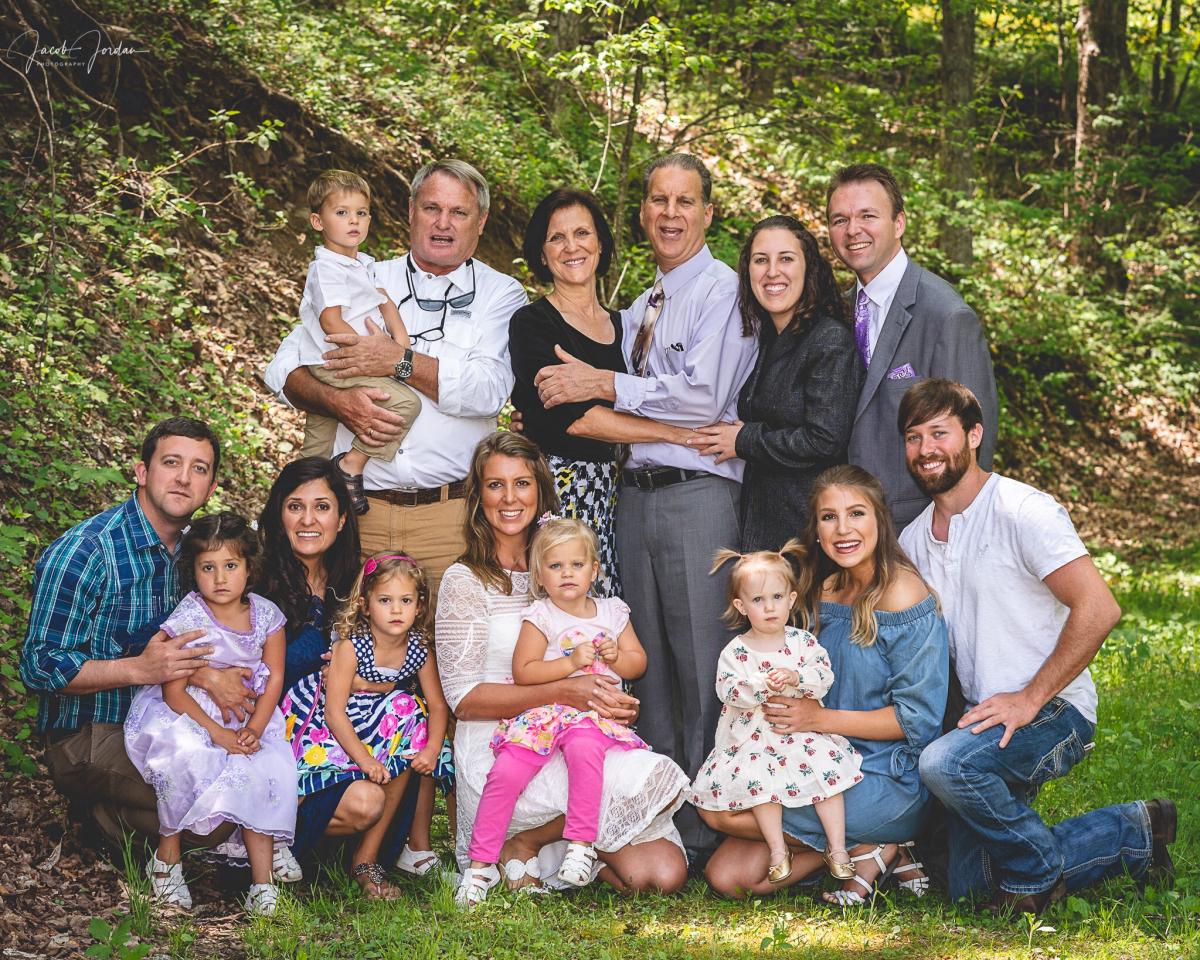
Priska and Pastor James Volpe (center) enjoy family time with (left to right) Jacob, Hannah, Sandra and Natalie Jordan (kneeling); Austin, Andrew, Francis and Zoe Aho; Angela and Mark Kent (standing); and Atalie Simons, Sarah Volpe and Austin Simons.
A Balancing Act
Finding a balance, as most two-career parents will agree, can be difficult, especially when the job demands are all-consuming. As Elizabeth David’s husband, Franklin, worked to grow the Potomac Conference’s Southern Asian church in Silver Spring, Md., he embraced the pastoral duties of visiting members, giving Bible studies and attending to emergencies. But this meant he spent less time at home, and Elizabeth “ filled more time with the children,” she says.
“I don’t think we went on family vacation or outings on Sunday or shopping because we always had something going on in the church community, and [the] pastor has to be there,” she says. “My children got used to it. As they grew and joined in church ministry with us, then the life was easier. They felt the responsibility of helping their father in the church, and they enjoyed it. And God blessed us.”

Top: Elizabeth and Pastor Franklin David (center), anked by Shalini, Tony and Eva Paulose (left) and Malini, Sanjay and Arabella Purushotham gather for a family portrait.
Elizabeth, a retired nurse, has been a pastor’s wife for 41 years. She worked the night shift, which helped her balance family and work needs. As the daughter of a pastor, she knew what she was getting into when she married Franklin. Though she grew up in a different culture, she saw what church members expected of her mother. “Even though my mom was a housewife, it was very challenging, tiring and frustrating for her at times, and I found it was hard for her to always please everybody. Many people criticized, they would watch the pastor’s wife, marriage and children growing up. ... I decided my priority is my family first.”
While Eric Crews was dating his wife, Pastor Heather Crews, he, too, decided that their family would be most important, and he would willingly follow her career moves. This decision hasn’t been without cost to his advancement as a software developer. When he got a job offer in Dallas, Texas, an hour and a half from his wife’s church at that time, he turned it down in order to stay closer to her. When they moved to Virginia—where she now pastors the Courthouse Road church near Richmond—he was able to telecommute, but the pay of his Texas- based job was not equivalent to similar jobs in that area.
Still, he has been able to continue his career and now has “the best job I’ve ever had,” he says.
Defying Tradition
Being a ministerial spouse doesn’t always involve a stereotypical set of duties. As a young pastor’s wife, Cindy Washington tried to fit what she thought was the traditional role of a pastor’s wife.
She’d taken piano lessons but had never considered playing for church. It took her a while to realize she had a choice. “If that’s not my gift, I don’t have to play piano just because that’s the typical role of a minister’s wife,” she says. “I can be who God called me to be and work through my gifts that God has given me.”
Cindy chose to participate in things like Pathfinders and Health Ministries.
She also chose to keep her job when her husband was reassigned. She began her career teaching high school, and then decided to go to nursing school. While those two professions—nursing and teaching—have traditionally been popular choices for pastors’ spouses, pursuing a career can still be a challenge and requires sacrifices. For her it meant staying in Columbus, Ohio, to continue teaching at the Central Ohio Technical College, when, almost three years ago, her husband was transferred two and half hours away to the Bethel church in Cleveland, Ohio.
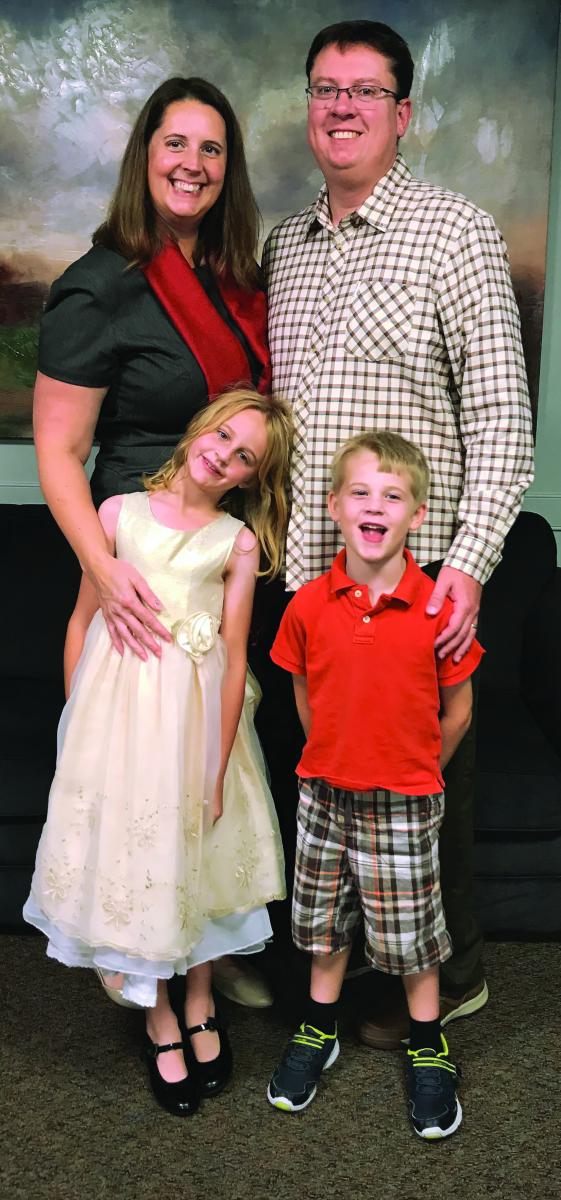 Eric Crews (pictured with wife, Heather, and Molly and Owen) has a full-time job as a software engineer, but that doesn’t stop his son’s 4-year-old friend from calling him a pastor.
Eric Crews (pictured with wife, Heather, and Molly and Owen) has a full-time job as a software engineer, but that doesn’t stop his son’s 4-year-old friend from calling him a pastor.
“I don’t know why he thinks I’m a pastor,” Eric says, laughing.
He would rather work in the background—designing sets, working with the AV team and tak- ing care of the couple’s young son and daughter.
“I told her, ‘I’m marrying you so I never have to go up to do prayer or anything,’” Eric says.
It hasn’t worked out so well. There are times when people assume he’s the pastor and ask him to pray.
“I think there are a few people who assume, not too many,” he says.
Double Duty
When Pastor Franke Zollman took his wife, Kandace, home to the Indiana church where he grew up, an “older saint” told Kandace,“‘It’s a shame you don’t play the ‘piany,’” Franke remembers.
As a 22-year-old pastor’s wife, Kandace wanted to be perfect. What she found was what one person thought was the perfect pastor’s wife, someone else thought was the worst. The traditional “prototype” of a pastor’s wife just never t. It was impossible to meet everyone’s expectations, she says.
Then God showed her, “The one you have to please is Me,” she says.
In truth, Kandace felt God’s call went beyond being a pastor’s wife. But in the late 1970’s, there were few opportunities for women in ministry. Still, she earned a bachelor’s degree in religion and a master’s degree in counseling.
As her husband built his 38-year pastoral career, she became an educator, teaching everything from preschool to high school and serving as a principal. At church, she gave Bible studies and was ordained as an elder at age 30. More than 25 years passed before her call to be a pastor would be fulfilled.
 Today she serves as the associate pastor of Chesapeake Conference’s Williamsport (Md.) church, along with her husband, who is the senior pastor.
Today she serves as the associate pastor of Chesapeake Conference’s Williamsport (Md.) church, along with her husband, who is the senior pastor.
While she relishes the role, her appointment has given her husband a new role as well: pastor’s spouse.
“We tease about it a lot,” Franke chuckles. “I did go to the ministerial spouse meeting during camp meeting. It was not geared for male ministerial spouses.”
There are few male spouses in Chesapeake Conference, and the Zollmans are currently the only pastor duo.
Supporting Roles
They aren’t the only pastor duo in the Columbia Union. Brooke and Jeremy Wong also serve as a ministerial team in Worthington, Ohio. Jeremy is the youth pastor at Ohio Conference’s Worthington church. Brooke is the children’s chaplain at Worthington Adventist Academy and Stepping Stone’s Learning Center, which is af liated with the church.
The two met their first year at Southern Adventist University (Tenn.), but they didn’t begin dating until their last year. Since both were on a ministerial track, Brooke says she wasn’t looking to date a pastor.
 “I knew that initially ... pastors were going to be held to a higher standard,” says Brooke. “The family would be on a pedestal of sorts. I was leery, but willing
“I knew that initially ... pastors were going to be held to a higher standard,” says Brooke. “The family would be on a pedestal of sorts. I was leery, but willing
to embrace that challenge. When both [spouses] are pastors, I think people take it to a higher level. ... I don’t enjoy that piece.”
When the couple started to get serious, Jeremy says it helped that Brooke’s strengths were his weaknesses. He has a laid-back personality. She is Type A. “I knew she would be a great support to me, and I would be a great support to her,” he says. “Career wise—it impacts me in the sense that there are times [that because] Brooke is a pastor as well, I need to take [the supporting] role,” says Jeremy. “On Sabbath morning, she preaches a lot more. ... It’s my turn to take care of [our daughter], JJ. It’s a different mindset, different situation. ... I need to be the one who gets JJ ready, takes her to church, takes her to Sabbath School. I’m in the background. I’ve always been OK with [the idea of] it, but now that I do it, [it takes] a different mindset.”
Looking back on it now, Brooke says she can’t imagine life any other way “because there are so many bene ts to doing ministry together. ... It encapsulates the entire lifestyle. So much so that I can’t imagine not being with someone who understands the importance of that life work. Life work [an Ellen White term], is a great term to use because [ministry] involves every aspect of the life.”

Add new comment